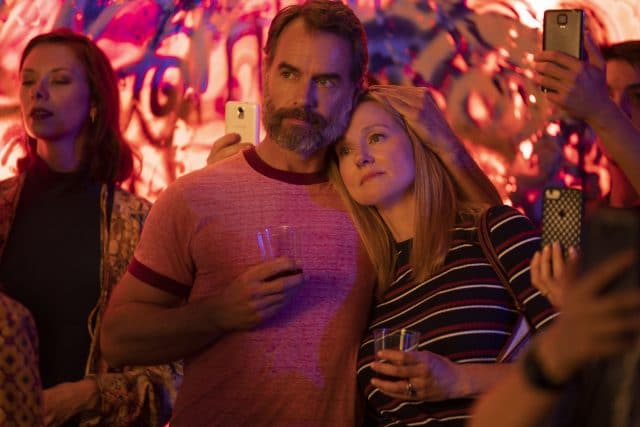
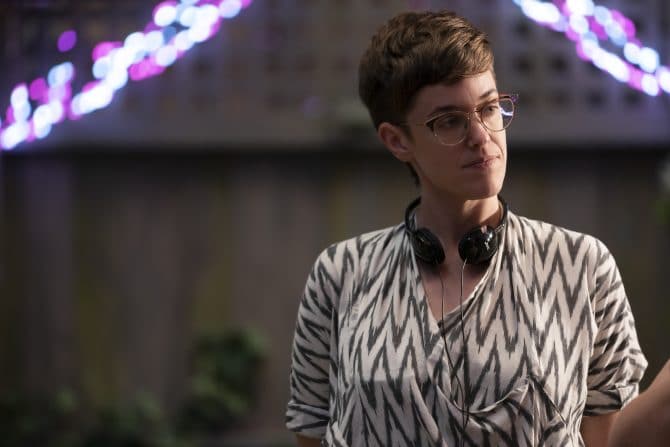 Lauren Morelli on set
Lauren Morelli on set
Believe it or not, Lauren Morelli never had any ambitions as a writer. Growing up in Pittsburg, she practiced dance, with the hope of one day turning professional. She continued her training while studying at Marymount Manhattan College before an injury ended her career.
She then discovered a gift for writing, beginning with a blog that caught the attention of Netflix executives working on a new dark comedy series: Orange is the New Black. Morelli eventually landed a gig writing for the series. Around the same time, she came out as a lesbian and married girlfriend Samara Wiley of The Handmaid’s Tale fame.
Now Morelli is writer, producer and show runner duties for the Netflix revival of Tales of the City. The much-anticipated revival of the iconic series, based on the work of Armistead Maupin, reunites original series stars Laura Linney, Olympia Dukakis, Barbara Garrick and Paul Gross with new castmates Ellen Page, Murray Bartlett, Charlie Barnett, Garcia, and Daniela Vega.
We managed to snag a few minutes with an upbeat Morelli to talk about the show, her life and the incredible responsibility of Tales to the queer community. Tales of the City streams on Netflix now.
I have a horrifying thing to tell you: I’d never heard of it.
I am serious. I think, actually, I felt lots of gay shame about that. What was so interesting though, and what ended up shaping this season in many ways was that I started to realize when I said that to some people, they had your reaction. A certain generation of person, a certain person who grew up in the [San Francisco] Ba, they were like, “What do you mean? Tales of the City is everything!”
Then I started to realize that other pockets of people, specifically—I’m 36—people who are younger than I am had a certain what are you talking about kind of reaction.
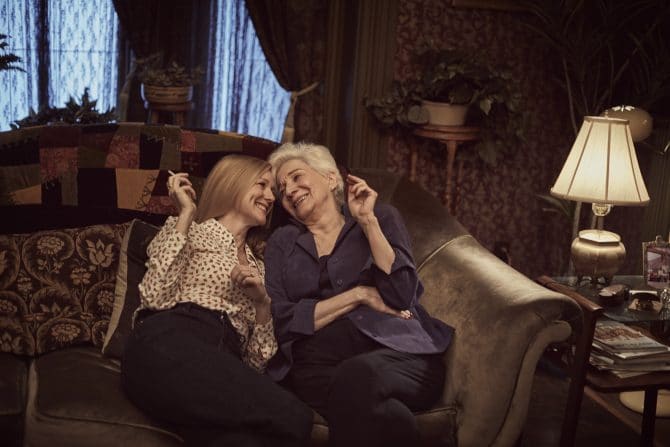 Laura Linney & Olympia Dukakis
Laura Linney & Olympia Dukakis
Really interesting, right? To think about this sort of cultural drop off in awareness because it had been so long since it had been in the popular zeitgeist. And what an exciting opportunity to be like there’s an entire generation of people who have not been exposed to this. How do we rope them in? But also, we have this multitude of generations, how do we serve them? How do we talk about this inter-generational conversation that we’re not quite having yet in the community?
They came to me. It had been in development for a couple years, as shows often are. The first phone call I got, they told me about the project. They told me there was a young, queer female character on the show who would be played by Ellen Page, and they were having a hard time making sure that her voice felt authentic. My first job on the show was just to come in and consult on Shawna’s voice, which was great because, first of all, writing for Ellen Page is a dream.
But that also put me into this mindset where I had to do a total dive into the material. I read all nine books. I watched the original series. Diving into the deep end that way, I was like, Oh my God, number one, how did I have no awareness of these books? And number two, I was struck by how relevant and revolutionary they still feel. It really helped me. I ended up writing a draft of the pilot, and Netflix picked the show up off of that pilot and asked me to show run. So when we went into the writer’s room, when we were making the show, it had equipped me with the feeling that we so need these stories. They’re so essential to our community and showing stories of love and joy and acceptance, which is what we need right now.
Almost all of the stories in the season are new, which is really such a gift: to have these amazing characters from Armistead, but then still be allowed to innovate and expand the world. So there are seedlings from the books. The idea of Mary Ann returning to Barbary Lane after being away for a long time but otherwise, we went off in our own direction.
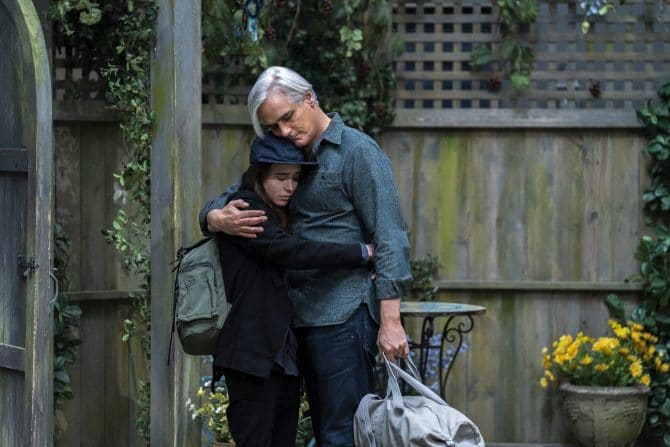 Ellen Page and Paul Gross
Ellen Page and Paul Gross
Armistead was very involved, thank goodness. He really was my north star. He was one of the first conversations I had, actually, just when I was working on Shawna. Just to call him and hear him talk about how he thinks of Shawna, and stories from the books he feels really attached to, was so inspiring. It felt like a lot of my job was sort of intuiting Armistead, and who he is and his creative spirit and translating the season.
You know, we had a conversation very early on. He’s just—as you can see on the books—the greatest. He is everything his books are. He’s so warm and generous and kind. And I was really struck by, in the books, how kind everyone was. It wasn’t that everyone was perfect.
People were making mistakes and messing up, but they were ultimately extending a real warmth. That was something that Armistead highlighted for me, and that felt like something to aim for. It felt like ok, we can push these stories forward as long as we are true to the original spirit.
I had those moments every day.
I’d go back and forth between true terror and then successfully pushing it out of my brain, and knowing that if I ever wrote, and if we, as a group in the writer’s room, already wrote with the audience in mind, then we had already missed it. I think when you’re ascribing those voices, you get into trouble. Especially in the queer community, you can get trapped in, “What’s a queer person allowed to do?” And certainly, we wanted to be very intentional around do no harm. We didn’t want to continue to perpetuate stereotypes. But how do we get it right and tell stories authentic to who these people are? Tell those stories, make sure you’re doing it with intent, but allow them to be real people.
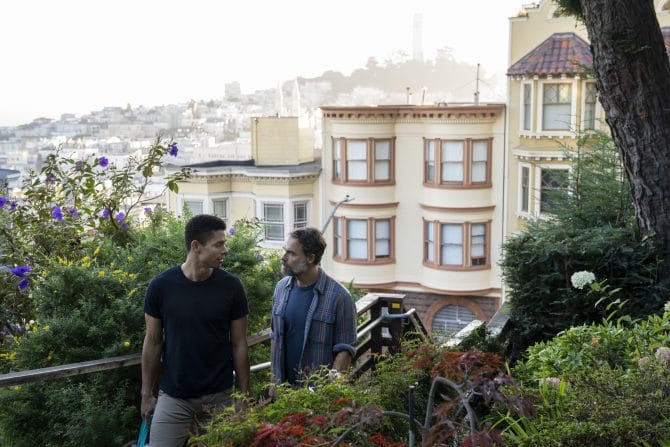 Charlie Barnett with Murray Bartlett
Charlie Barnett with Murray Bartlett
Absolutely.
I think the authenticity is based in the creative team. That happens on two levels. One of those has nothing to do with me and everything to do with everyone who came before me. Among the executive producers, there’s me who’d never heard of Tales; Alan Poul, who produced the original and has been in this world for decades, Armistead who is the reason for everything, and Laura Linney who comes at it from another enriching perception. It was so interesting. In the beginning, I felt like my job was to pay attention and listen and really understand the historical significance of what Tales meant. I would listen to them tell stories about when the original came out, what it felt like to be in the San Francisco Pride Parade after it came out, and how different it was to make this show then as opposed to now.
Then, in terms of the writer’s room, it felt like…so often as a community we get painted as one thing. We’re the LGBTQ community and we’re not sure what that means, but we’re one thing!
[Laughter]
So putting writers in the room that had very different, very specific queer points of view separate from my own felt like the only way to do this. I have my own experience as a queer person, and that looks and feels very different from someone who is of a different class, or race, or gender identity, or generation.
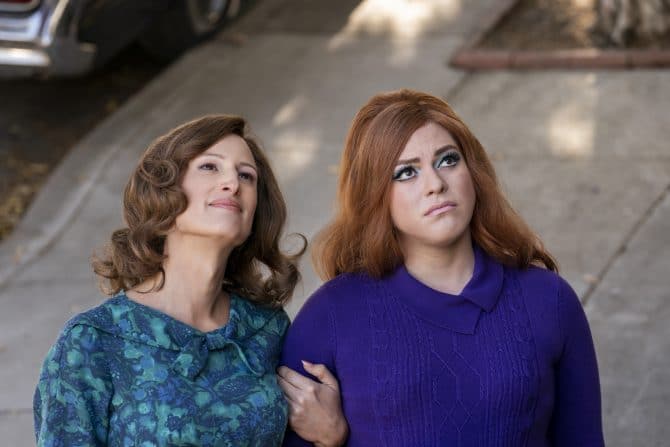 Jen Richards & Daniela Vega
Jen Richards & Daniela Vega
So the dinner party scene that you reference, in many ways, contains the heartbeat of what we were doing. It was interesting to watch the evolution of that. Andy Parker, who’s a brilliant writer, wrote that episode. I remember when he brought in the original draft, it was so wonderful and nearly pitch perfect. But this debate broke out in the writer’s room because someone said they broke down in tears and felt so much for Chris II, who’s played by Stephen Spinella. But then someone else in the room, immediately said, “I don’t feel anything for him! How dare he say those things to a young person of color! He missed the point.”
So allowing that dialogue to happen in an organic way, and then let that dialogue serve the writing on the page to fine tune it so you feel empathy for both of them. You have to then engage yourself to figure out where you fall on the spectrum. If I had sat down to write that scene, it wouldn’t be a fourth of as good as it is.
It’s sort of what you were saying. I intellectually understand the AIDS crisis and what those who came before us went through. But emotionally I can never understand the depth of feeling. So to have people in the writer’s room and on the producing team contributing their own experience to what goes on screen is why it’s awesome.
That’s right. Yes! It gets me so excited.
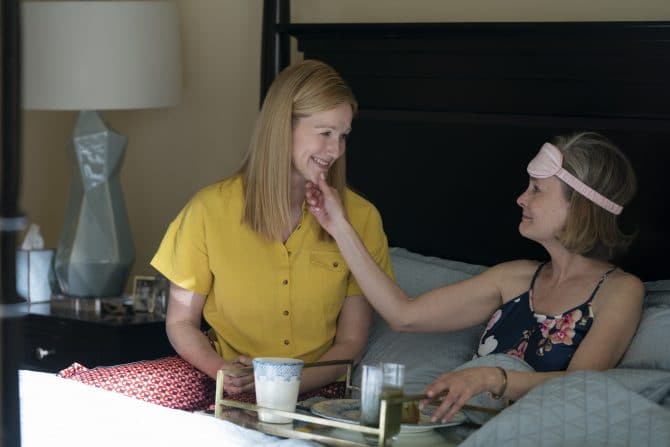 Laura Linney & Barbara Garrick
Laura Linney & Barbara Garrick
I think what you just said—my ability to be a writer is dependent on my ability to access empathy. If I’m ever writing a character from a place of judgment, I’m probably not doing my job right. I think when you’re forced into stepping into something like Chris II’s shoes, where you really need to make sure that speech sounds like it’s coming from an internal place rather than me projecting it onto the character, and then to have to jump across the table and write from Ben’s perspective. And when you make sure that everyone’s perspective is specific and honest, as you said, then the emotion comes. I don’t like to have ideas thrown at me when I’m watching something. I want to emotionally feel the themes, rather than be lectured.
The process of being on set, much like the process of making the whole show, was very collaborative. One of the amazing things about getting to participate in this version of Tales is that I had four actors who had been inhabiting their characters long before I even knew they existed. To have Laura Linney and Olympia Dukakis be able to speak to the experience of who these characters were, who they were becoming, more than me answering questions, it felt like my job was to listen. If something wasn’t sitting right, having those conversations from people could contribute in such a significant way, it was a dream. It makes the work so much better.
We also worked hard to make sure we had a lot of queer presence behind the camera. Silas Howard directed episodes three and four. To have someone who is so accomplished who also happens to be transgender can read a scene where Jake and Margot are debating something, and to have Silas’ perspective on it, felt really amazing.
So this is an epic undertaking.
[Long pause]
Wow. That’s such a good question. I learned a lot about myself. I think, on a personal level, being in the writer’s room which was an entire queer space, was extremely powerful and really healing. Being in a writer’s room can be extremely intimate and intense. Being in that space and not being “othered” for even a second was one of the most profound experiences of my life. Then, on a professional level, I learned a lot about being a boss and holding power and my relationship to power. It’s interesting to come up against how many of our ideas about power are gendered.
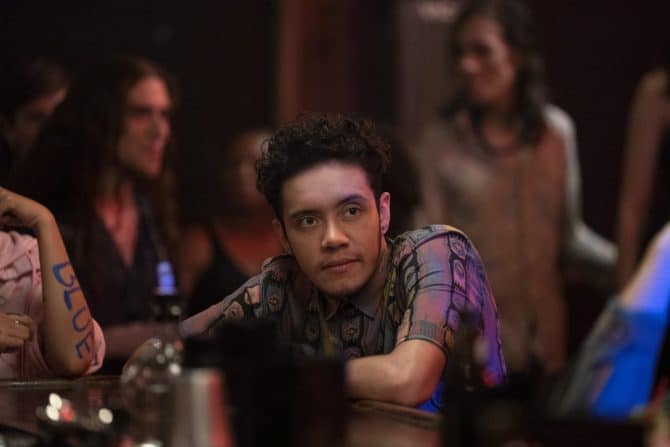 Garcia
Garcia
It felt very important to me to be very thoughtful and intentional around it, and can I hold it differently? I think that’s part of the national conversation right now: dismantling power, our relationship to power. I felt like I learned a lot, and like I have a million more things to learn.
You know, my official answer is that this is constructed as a limited series. It felt really important to all of us that the season feel like a book. I wanted to finish the last episode and have something emotionally satisfying as a whole. But never say never.
We can sit and hope together.
Tales of the City streams on Netflix now.







